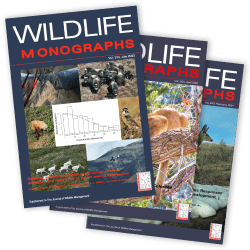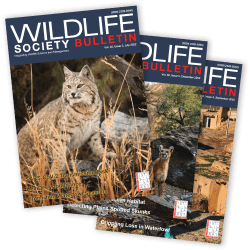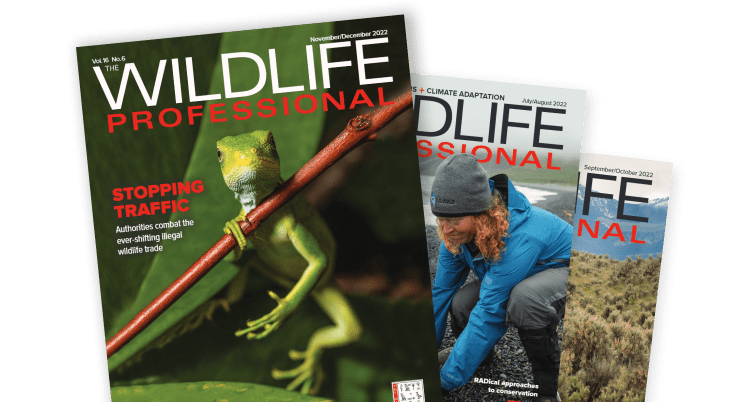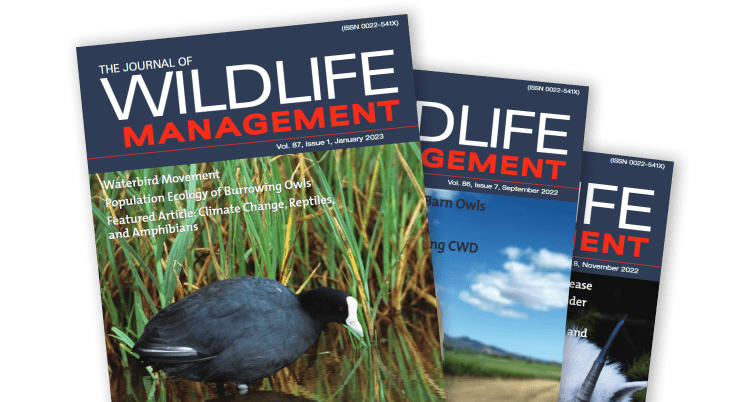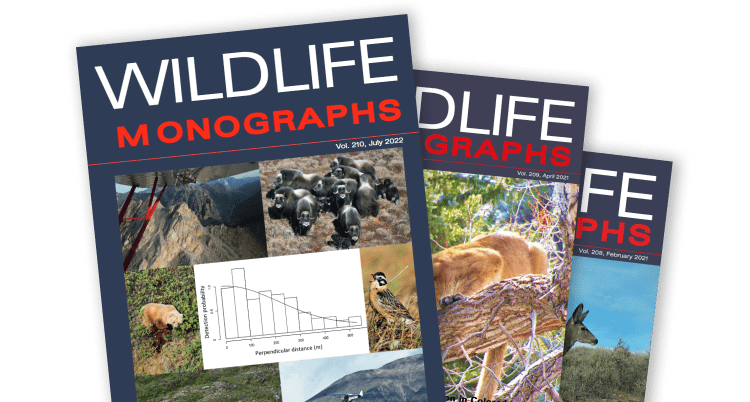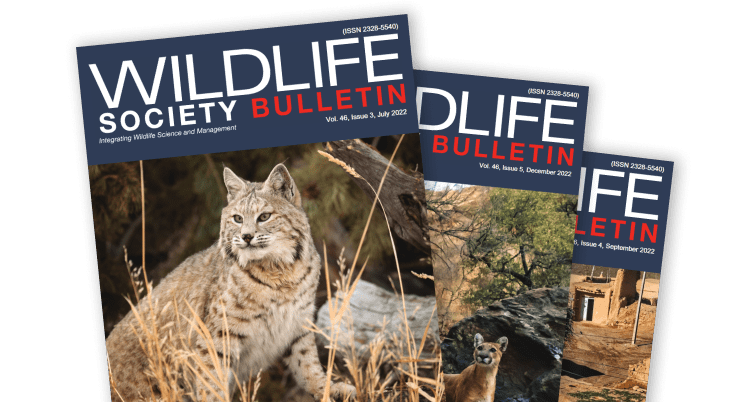The Wildlife Professional
-
Overview
This magazine provides news and analysis to inform wildlife professionals about advances in wildlife science, conservation, management, policy and education. It features in-depth articles, summaries of relevant scientific papers, profiles of wildlife professionals, new field techniques, and more.
-
Contact
Keith Norris, Editor-in-Chief, Director of Wildlife Policy & Communications
An Editorial Advisory Board composed of members representing TWS Sections and Working Groups and at-large members guides the content of The Wildlife Professional. The board and the publication follow Rules of Governance to ensure that the magazine remains vital, informative and relevant to TWS members.
-
Frequency
The Wildlife Professional publishes six issues per year.
- January/February
- March/April
- May/June
- July/August
- September/October
- November/December
-
Submissions
Interested in submitting an article to The Wildlife Professional?
THE JOURNAL OF WILDLIFE MANAGEMENT
-
Overview
The Journal of Wildlife Management, published continuously since 1937, is one of the world’s leading scientific journals covering biodiversity, climate change, competition, conservation, diseases that influence populations, ecology, economics, genetics, habitats, habitat restoration, human-dimensions, human-wildlife interactions, hunting, landscape ecology, management, sustainable use, quantitative approaches to ecology, and models, among others.
-
Contact
For general information, contact the journal’s editorial office.
For a list of the journal’s current Associate Editors (AEs) and their areas of expertise, click here.
Want to become an AE? Click here to find out how.
-
Aims & Scope
The journal publishes articles that focus on aspects of wildlife that can assist management and conservation by providing life-history data, modeling, new analytical and quantitative approaches, theory, and new approaches to understand human dimensions. Authors are invited to submit papers on the following topics:
- Book reviews
- Commentaries and topical reviews
- Economics related to theory and research
- Human dimensions related to theory and research (e.g., new approaches to understand human dimension surveys)
- Investigations into the biology and ecology of wildlife that benefit management and conservation (e.g., life histories, demography, movements, and habitat relations that are useful to better manage and conserve wildlife)
- Modeling of populations, habitat, or human dimensions
- New analytical and quantitative methodological approaches related to wildlife science (e.g., statistical, quantitative)
- Theoretical concepts that benefit management and conservation
-
Frequency
The Journal of Wildlife Management publishes eight issues per year.
- January
- February
- April
- May
- July
- August
- September
- November
-
Technical Info
Editor-in-chief: Paul R. Krausman
2021 Journal Impact Factor: 2.586
2020 Journal Citation Reports Ranking: 31/175 (Zoology) and 97/166 (Ecology)
Source: Clarivate Analytics 2022
Online ISSN: 1937-2817
-
Submissions
Interested in submitting an article to The Journal of Wildlife Management?
-
Institutional Subscriptions
Please contact our publisher, Wiley, for institutional subscriptions.
The Journal of Wildlife Management/Wildlife Monographs (bundled subscription)
Wildlife Monographs
-
Overview
Wildlife Monographs, published since 1958, are single-topic, peer-reviewed studies on specific problems and issues in wildlife science, management and conservation.
-
Contact
For general information, contact the journal’s editorial office.
-
Aims & Scope
Wildlife Monographs, one of three peer-reviewed journals of The Wildlife Society, publishes research regarding the management and conservation of wildlife, emphasizing comprehensive synthesis of a topic.
Wildlife Monographs publishes manuscripts containing information from original research that contributes to wildlife science. Suitable topics include investigations into the biology and ecology of wildlife and their habitat that have direct or indirect implications for wildlife management and conservation. These topics include information on wildlife habitat use, demographics, life-history, genetics, predator-prey relationships, space use, movements, modeling, behavior, and physiology. Emphasis is placed on how the research fits within the context of contemporary management and conservation issues and can inform wildlife practitioners.
Wildlife Monographs also considers extensive reviews, meta-analyses, long-term or interdisciplinary research, and invites contributions on timely special topics providing a meaningful new synthesis or research results on an appropriate subject. Manuscripts generally will be >50 double-spaced pages, present a comprehensive examination of a subject, include an in-depth literature review and context, and provide a broad interpretation of concepts advancing wildlife science and management.
-
Frequency
Wildlife Monographs publishes at least one issue per year.
-
Technical Info
Editor-in-chief: Steeve D Côté
2021 Journal Impact Factor: 5.400
2021 Journal Citation Reports Ranking: 4/175 (Zoology) and 31/166 (Ecology)
Source: Clarivate Analytics 2022
Online ISSN: 1938-5455
-
Submissions
Interested in submitting an article to Wildlife Monographs?
Read our author guidelines.
Submit a manuscript. -
Institutional Subscriptions
Please contact our publisher, Wiley, for institutional subscriptions.
The Journal of Wildlife Management/Wildlife Monographs (bundled subscription)
Wildlife Society Bulletin
-
Overview
This fully open-access, peer-reviewed publication contains papers related to wildlife management, law enforcement, education, economics, administration, ethics and more.
-
Contact
For general information, contact the bulletin’s editorial office.
For a list of the journal’s current Associate Editors (AEs) and their areas of expertise, click here.
-
Aims & Scope
The Bulletin focuses on manuscripts that directly assist with on-the-ground management and conservation. Authors are invited to submit papers on the following topics:
- Administration (e.g., papers that deal with the administration of wildlife agencies, organizations, and programs)
- Analysis of wildlife management and conservation programs including successes and failures (e.g., evaluation of ongoing programs or programs that have been implemented, analysis of reports, analysis policies)
- Commentaries and topical reviews
- Economics related to on-the-ground management (e.g., costs of different techniques, management)
- Education (e.g., all levels of academic advancement)
- Human dimensions related to on-the-ground management (e.g., surveys, attitudes, values)
- Law enforcement
- New techniques for on-the-ground use (that have been evaluated for accuracy) or an evaluation of different techniques for-on-the ground management
- Philosophy
- Regulatory impacts and processes
- Sociology
- Student voices
-
Frequency
The Wildlife Society Bulletin publishes four issues per year.
- March
- June
- September
- December
-
Technical Info
Editor-in-chief: Bret Collier
2021 Journal Impact Factor: 1.739
2021 Journal Citation Reports Ranking: 38/60 (Biodiversity Conservation)
Source: Clarivate Analytics 2022
Online ISSN: 2328-554
-
Submissions
Interested in submitting an article to the Wildlife Society Bulletin?
Read our author guidelines.
Submit a manuscript.
Books
Our books cover a wide variety of topics related to wildlife management, conservation and policy. TWS members receive discounts on TWS books published by Johns Hopkins University Press.
Visit the BookstoreTechnical Reviews
Technical Reviews are scientific analyses related to prominent topics and issues in wildlife science, management, conservation and policy. Technical Reviews are written by panels of experts and are often used in preparing TWS position statements.
Learn MoreMore Info
Interested in submitting an article to one of our publications? Our publications accept submissions across different categories that reflect the broad range of activities and concerns of wildlife professionals.
Get Published




